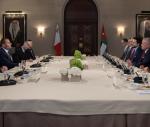You are here
Political objectives behind cheap oil
Jan 26,2015 - Last updated at Jan 26,2015
Economists in most countries of the world are busy calculating the benefits of the unexpected windfall to their economies as a result of the 50 per cent drop in the cost of imported petroleum.
Economists in other countries are worried about the huge loss in revenues, and started to recommend austerity measures to withstand the crisis.
Arab Gulf states led by Saudi Arabia took the position that the price collapse of their main export commodity may be of temporary nature, and that they can afford their planned public spending during this year.
Budgets for 2015 prepared before the drop of oil prices were not revised.
These rich countries have huge reserves in their sovereign funds, from which they can draw to fill the gap if need be.
Some estimates indicate that Gulf states can stand the reduction of oil price as long as it remains above $40 per barrel.
Other oil-exporting countries such as Russia, Iran and Venezuela do not pretend that they do not have a problem. They started austerity measures, some effective, others symbolic.
In Venezuela, for example, socialist President Nicolas Maduro volunteered to reduce his monthly salary in an attempt to urge other officials to follow suit.
This is, of course, a tough medicine when the inflation rate is hovering at around 60 per cent.
In Iran, the minister of finance hopes that the price of oil will bounce back and rise to $136 a barrel in order to cover his country’s budget deficit.
But until then, the price of bread was raised by 30 per cent.
In Russia, the ruble lost more than one third of its value against the dollar. The Russian economy is expected to dip into deep recession and its gross domestic product is expected to experience a negative growth of 5 per cent in 2015.
If it is true that the nosediving of the world oil prices was the result of a conspiracy between the US and Saudi Arabia, then the purpose will not be confined to the creation of certain economic difficulties in certain countries, such as those mentioned above; the purpose must be far reaching.
Venezuela, for instance, must stop supporting and financing revolutionary movements in Latin America and elsewhere.
Iran should cease to expand its regional influence, cease to support and finance its costly operations in Lebanon, Syria and Yemen, and also maybe freeze its nuclear project, or be tempted to make a deal.
Russia should reconsider its role in Ukraine, abandon the Russians of Ukraine and leave this country to join the North Atlantic Treaty Organisation.
It is of course too early to make a judgement on whether the above political and strategic objectives can be realised, and to what extent.
In Jordan, the economy will save some one billion dinars a year due to the low oil price, but the budget may not benefit much, as a major portion of the public expenditure is represented by salaries, wages, interest, rent, debt repayment instatements and capital expenditure, which will not be influenced by cheaper oil and the removal of fuel subsidy.
The only benefit may be reducing the losses sustained by the National Electric Power Company.











